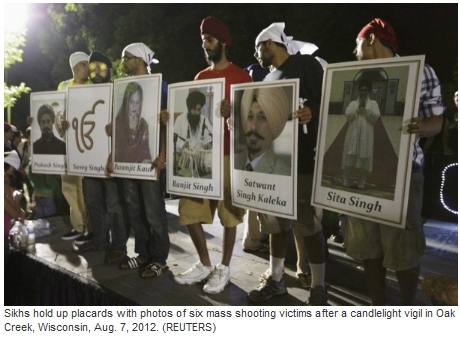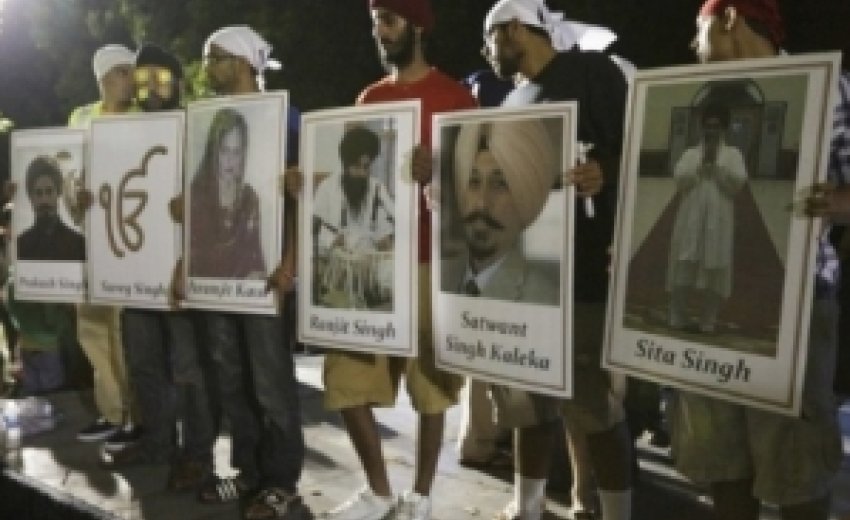
On 5th August, a gunman opened fire in a Sikh gurdwara in Oak Creek, Wis. One of the victims, Punjab Singh, is still fighting for his life in a Milwaukee hospital. I had never met him before, but when I went to visit him on Sunday, I did not see a stranger: I saw my grandfather.
In recent days, the blogosphere has buzzed with speculation over why media coverage of the massacre in Aurora, Colo., was far more extensive than in Oak Creek. Many argue that Americans could imagine themselves in a movie theater but most had never entered a gurdawara. They could imagine the people in the theater as their family and friends, but they relate less to people with foreign-sounding names in turbans and headscarves, and so the tragedy in Oak Creek had less emotional resonance.
But when Sikhs saw the news of the massacre unfold, they imagined gunfire in their own gurdawaras; they saw their own mothers and fathers, aunts and uncles, children and grandparents bleeding and grieving. When I visited Baba Punjab Singh, I remembered my own grandfather fighting for his life.
If our ability to unite as a nation is about who we see as “one of us,” then education alone will not help us transform the American psyche. We need stories. We need stories that bind us, break us open, and make us human to one another. Only storytelling can cultivate the empathy that invites us to imagine walking in another’s shoes. In the weeks after Oak Creek, we should encourage Sikh Americans – and all people struggling for civil rights and human dignity in America – to tell their community’s stories through art and film, photography and testimony, poetry and song.
I witnessed the power of storytelling firsthand through touring with Divided We Fall, the film produced together with Sharat Raju. It was the first feature documentary film about the Sikh American experience after Sept. 11, 2001. When we released the film, news spread word of mouth and we launched on a tour to 200 U.S. cities, screening the film with a social action campaign that inspired dialogue workshops, panel discussions, and classroom discussions. We sometimes coupled the documentary with Raju’s “American Made” (starring Kal Penn), the first narrative film featuring a Sikh American family after Sept. 11. Together with films like Tami Yeager’s “A Dream in Doubt” and Kevin Lee’s “Dastaar: Defending Sikh Identity,” we inspired pockets of grassroots dialogue about hate, fear, hope and healing in America.
Most importantly, these films about the Sikh American experience catalyzed remarkable moments of solidarity. After one film screening, I remember an African American man in Chicago stood up after the film, pointed to his braids, and said, “My braids are my turban.” In New England, a Japanese American woman shared, “My grandparents were interned in the concentration camps during WWII. No one raised their voice then; I will raise my voice for you now.” A gay man in New York said, “I must fight for the rights of Sikhs to wear their turbans, just as I fight for the right of LGBTQ people to come out of the closet. We have to fight for one another.”
These were not empty statements. In the wake of the tragedy in Oak Creek, hundreds of people who had seen “Divided We Fall” or “American Made” wrote emails, sent texts, posted on my Facebook page, and yes, made phone calls. When I sent a call for messages to members of Groundswell, a multifaith social action initiative at Auburn Seminary, we collected 4,000 letters of love and support within a few days. Thousands of people who had heard our stories attended hundreds of vigils across the U.S. Stories can build the solidarity that help us see ourselves in one another. Stories help us see that the struggle of Sikh and Muslim Americans are bound up with the African American struggle, the Latino struggle, the struggle for gay liberation and women’s liberation.
To be sure, storytelling may not seem robust enough to prevent another Oak Creek. We need the government to track anti-Sikh hate crimes, pass stricter gun control laws, and end racial profiling in immigration, national security, and criminal arenas. We need elected officials to pledge not to fan anti-immigrant or anti-Muslim rhetoric this election season. We need educators to expand curricula and faith leaders to step up interfaith engagement. But all of these efforts depend on our communities strategically telling vivid and compelling stories to general audiences, changing public opinion and applying the right pressure on legal and political institutions.
When First lady Michelle Obama visits Oak Creek this Thursday, the families of Punjab Singh and other victims of the mass shooting will have the opportunity to tell her stories about their mothers, fathers, children and grandparents. May it catalyze a new wave of storytelling for all of us, so that we may follow the call of Guru Nanak, the first teacher of the Sikh faith: “I see no stranger.”
Valarie Kaur, an award-winning filmmaker, legal advocate, and interfaith organizer, is founding director of Groundswell, a multifaith initiative. Her documentary “Divided We Fall” is the first feature film on hate crimes against Sikh Americans after 9/11. You can follow her on Twitter at @valariekaur.






